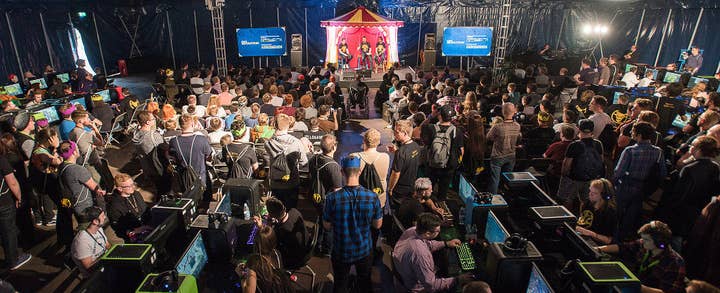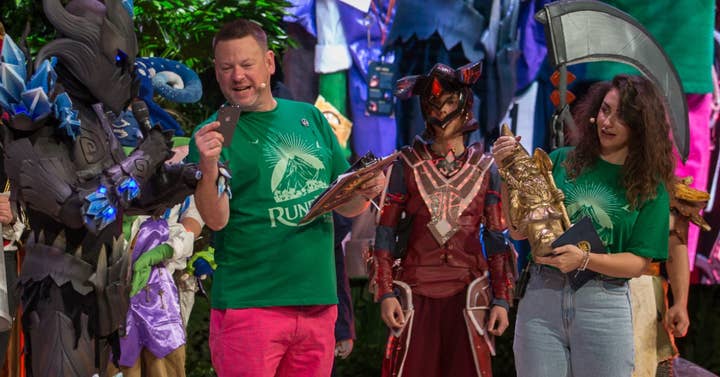How to successfully carve yourself a position as a communications leader
Jagex communications director Rich Eddy offers a overview of the many comms and editorial roles available at games companies
There is huge potential for candidates who both want to work in and progress through the industry -- and not just in games development.
Making a successful game is by no means guaranteed. When looking at why certain games become hits, there are multiple ingredients that make up the mix. Firstly, it has to (of course) be well developed, secondly it has to appeal to the right audience, and thirdly (and directly related to point number two) it has to be positioned and marketed in the right way.
The role of the communications team is fundamental to games companies that want to build their own brand as well as its franchise IP to effectively engage with their target market and to deliver enough return on investment to ensure sustained growth. This is of even more importance in the field of live game operations and living games, which can attract communities of invested players over years and even decades.
Having worked in the games industry for 35 years -- and having seen huge changes in the industry as it transitioned from packaged retail goods to online services to become the biggest entertainment medium on the planet -- here are a few lessons that I have learned about how to navigate the complexities of this sector while also carving out a path that will allow you to build a successful career in communications.
Embrace your passion for the industry

My interest in games started in the 1980s when the home computer boom happened; for the first time, you could just about afford an entry level computer at home. A combination of the ZX Spectrum and Commodore 64 opening a world of on-screen words and pictures, games magazines, such as Crash and Zzap!64, hitting mainstream circulation levels, and I became fascinated and passionately interested in the culture of gaming.
It was today's equivalent of community online and offline interaction, where on one hand you could experience the beauty of the game itself, strengthen personal friendships by shared interests, and share your thoughts and advice to the wider community with letters, drawn game maps, and playing tips, to those game publications that were looking for content. It was a wonderful hybrid experience of personal creativity and gameplay.
Back in those days, my Saturday job was working in a games retail store, and this is where I became intrigued with the business of games -- what people were buying, what games were being released, what the sales forecasts would be. The crossover point came with Computer Trade Weekly -- the trade paper of the time, which also carried entry level industry job ads -- and there was an opening with Crash magazine. Already interacting with it as a reader and letter writer, I wrote a passionate letter communicating my love of gaming, my growing interest in the workings of the industry and therein started my career as a games writer; choosing what I loved over going to university -- experience is where it's at, right?
Nowadays there are thousands of courses which will help prepare you for a career in gaming -- all sides of it -- and these should be leveraged. It's a competitive field and anything that can give you an advantage over others is worth doing. However, don't forget what excites you, and don't let learning replace passion. Embrace the subject matter in all its forms, looking beyond the enjoyment of the game experience -- if you can be excited by the whole space that a particular game occupies then you are on to a winner.
You don't have to be a developer to be in gaming
You don't have to be a game developer or a technology specialist to work in the industry. There are myriad opportunities that meet the needs of a range of different skills and experiences. Also, just because you're interested in a part of the industry, it doesn't necessarily mean that you're good at that part. I experimented with programming languages, but soon realised I was better off making use of my English language skills and, hence, ended up with a career in games communications. Be open minded and explore all opportunities that present themselves.
Don't forget what excites you, and don't let learning replace passion. Embrace the subject matter in all its forms, looking beyond the enjoyment of the game experience
When I realised that programming wasn't for me, I drew a Venn diagram of everything I loved, was interested in and was qualified to do, and I worked on from there. The range proved to be massive encompassing everything from language, media, to artistry to marketing to the actual business part. And that was not including other areas like HR, finance, legal, audio engineering and the list goes on...
Furthermore, gaming is not the niche field it was when I started out -- as demonstrated by the sheer volume of people now engaging with games. It is a thriving entertainment business which now competes with the likes of Netflix and Spotify for people's time. Don't let anyone tell you it's a niche.
Communications is a broad category
When people look at communications, it's often seen it as a single function that covers everything. This can be the case in some environments, but there are many categories within communications that people can either use as a starting point or which they can choose to specialise in as their career progresses.
If player engagement excites you there are many player-facing roles that can be pursued including player support and experience, community engagement and events management. The key to all of these is understanding how to engage, excite and talk to players in the way that they talk to each other. This type of role can also be a very good entry point for people who have interacted with player communities or who have worked in customer service within any industry.
Then there are the opportunities that the external communications function presents -- outside of player-facing comms, areas such as product messaging, media relations, corporate communications and even internal comms. This is all about how information is built and ideas are shared.
If languages are your forte, then there are opportunities with roles that focus on localisation and translation -- ensuring that every player no matter where they are in the world is both communicated with and made to feel part of the community.

Next is the whole editorial side of the games industry -- developing website content, drafting player comms that go through customer relationship management teams, preparing engaging copy for socials. There is huge scope to engage with the community just based on what you write. Bear in mind though that if you go down this route, you need to get under the skin of the game and of the players. And if you haven't been involved in a gaming community before, you need to show how your experience of high-level fandom knowledge and passion come together to engage in the right way.
Working at an agency quickly teaches you how to work on multiple projects simultaneously, enabling new recruits to get up to speed very quickly
For the more creative folks, there is the artistic piece which is focused on how things should look. From illustrations to advertising to video production to streaming this side of the gaming communications industry can be hugely appealing for those who are naturally visual.
Then there are events -- normally a hugely important area for the games industry (Covid permitting) -- where teams spend months and years planning for fan festivals, exhibitions, conferences, awards and parties. For this side of the business, you really need a creative mind and an attention to detail. Events are all about showmanship -- you need to be able to both piece together the individual elements and deliver the big picture in a way that gets our audience excited and engaged.
Finally, there is the commercial side of the communications function which can range from product marketing to CRM to even business development. For these roles, pursuing a qualification in marketing or business is the best and fastest route to getting a foot in the door of a games company.
Striking the balance between agency and in-house
Working in the games industry is not just about working for an established studio, although there are clearly many advantages to doing this. An effective in-house comms team should know the workings of the business like no other department, acting as the mouthpiece for that company. However, it can be very easy to get locked into the in-house life, which can be pressurised at times and with a very broad remit.
The alternative is to work for a communications agency which has games and entertainment businesses as clients, or a games specialist agency. Starting out in the industry this way, quickly teaches you how to work on multiple projects simultaneously, enabling new recruits to get up to speed very quickly. Agency folk are hungry, agile, are results-focused and generally have a very broad spectrum of knowledge of both their clients and their clients' competitors. Also, as someone who has an inherent interest in gaming, bringing your fandom knowledge to an agency is an extremely valuable thing to do.
Communications in the ever-evolving gaming industry brings with it a lot of learning and experiences that, quite simply, you cannot get with many other industries. The passion that people feel for both the games and the players is unrivalled -- it is what gets you up in the morning and it is what often keeps you awake at night. The possibilities are endless, and they are all yours for the taking. You just need the mindset, the passion, the determination, and the confidence. And you don't need to be a developer. We are open to everyone.
